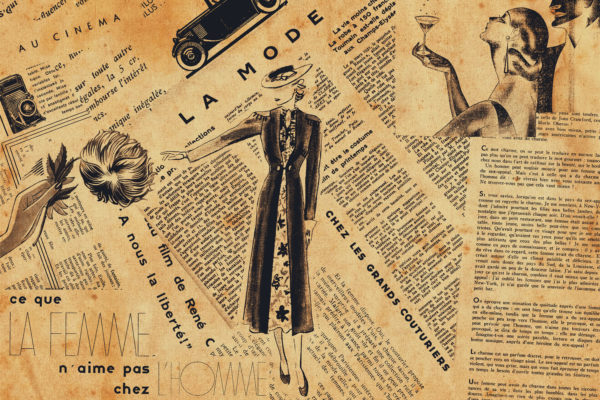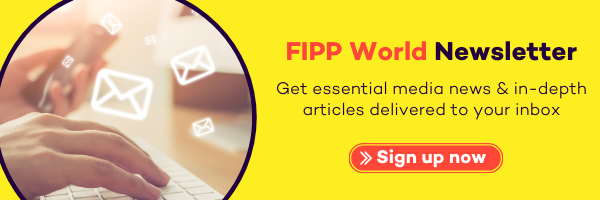The Week Kick-off: Creativity and diversity lead the charge into the post-lockdown world
We kick-off a week fuelled by industry creativity and diversity today, as tomorrow’s Digital Innovators’ Summit (DIS) session features the world’s first pureplay TikTok agency and Thursday brings the unveiling of the latest set of BBC 5050 Project results. We’ve also got Twitter in Ghana, influencers in Dubai, and a journey back to the 1930s for a look at how magazines were first transformed into high art! So grab your Monday morning coffee, and join us for the most innovative informative in media today…
World’s first TikTok pureplay on creative storytelling
The joint FIPP-VDZ Digital Innovators’ Summit Series continues tomorrow, with a unique look at creative storytelling. FIPP CEO, James Hewes, will be joined by Adil Sbai, CEO of Austria’s weCreate. The agency was the first TikTok pureplay to be launched anywhere in the world last year, and supports brands with data, strategy, and consulting, as well as maintaining a network of TikTok influencers. You can find out more about the event here.
BBC 5050 Project to release results of latest study
This week will also see the unveiling of the latest set of BBC 5050 Project data, which monitors the representation of women within the company’s editorial conversations. In October 2020, the initiative was expanded to include disability and ethnicity monitoring, and this year for the first time the report will also provide results from the BBC’s partner organisations, in addition to the 650+ teams taking part internally.
We’ve got a video interview with Nina Goswami, BBC Creative Diversity Lead for News and the 5050 Project, coming up later in the week, who told us: “This is the first time that we’re going to be publishing our gender data together. This is going to be a quite exciting – although also slightly frightening – moment, because I have no control over how our partners do (but I have full faith in them!) So this is a really big moment for us, and that’s why you would have seen that real flurry of activity you mention around International Women’s Day last month, because it’s not just the BBC on its own for the first time, it’s all of us together.”
Twitter in Africa
Hopping across the Mediterranean from Europe to Africa, and Twitter last week announced that it is establishing a presence on the continent, with Ghana being the chosen point of entry. Writing on the Twitter blog, Kayvon Beykpour, Product Lead for Twitter and Co-Founder of Periscope and Uche Adegbite, Director of Product Management in Global Markets, said:
“We are looking for specialists to join several teams including product, design, engineering, marketing and communications. Full details on current job openings can be found on the Twitter Careers site. Aligned with our existing WFH policies, we look forward to welcoming and onboarding our new team members remotely so that we can make an immediate impact while we explore the opportunity to open an office in Ghana in the future.”
Somewhat controversially, the move has not been welcomed with open arms in all quarters of West Africa, as the continent’s largest economy was left feeling snubbed. Nigeria’s Minister for Information, Lai Mohammed, responded to the move saying, “The natural expectation would have been for Nigeria to be the hub for Twitter in this part of Africa,” and blamed negative domestic media coverage of the country for Mr Dorsey’s decision to look elsewhere. Watch this space!
Influencers in Dubai
Those who have experienced a flurry of influencer activity emanating from Dubai on their Instagram timelines in recent months could be forgiven for thinking that this is a purely lockdown-inspired trend, brought about by the country’s more open approach to the coronavirus pandemic. But the United Arab Emirates city, with its serene social media backdrop of skyscrapers and sunlit beaches, has longsince been a desired destination of the image-conscious influencer.
A beautifully insightful feature written by Middle East Journalist, Ruth Michaelson, for The Guardian last week, gives a deep insight into the symbiotic relationship between the city’s picturesque landscape and its growing influencer population:
‘Once a small port on the edge of a desert, Dubai has become a global hub of influencer culture, a magnet for social media stars desperate to tweak their image in what has become the ideal Instagram city. The emirate is home to a vast industry of aspiration: agents and producers trained to boost follower counts; hotels and luxury brands eager to use social media as cheap advertising. A few influencers have turned their hard-won follower count into offline businesses… Already built on the illusion of unlimited indulgence, Dubai has at times appeared a parallel universe as other countries wrestled with Covid lockdowns.’
How Magazines Became High Art in the 1930s
From one insightful piece of industry writing to another, as art, culture, and entertainment journalist, Nadja Sayej, writes for Forbes on how an exhibition now at the Jewish Museum in New York City shows how photography changed magazines both pre-and postwar in America:
“European artists who arrived in the US, forced out of Nazi Germany, brought their grand visions to the arts abroad, be it fashion, advertising, photography or art. Among the biggest magazines of the time, like Life, Harper’s Bazaar, Vogue or Look magazine, they brought a fresh aesthetic that was different from their American counterparts.”
And more from FIPP…
In addition to talking Tik-Tok, FIPP will be running further training this week, namely in the form of tomorrow’s session on Creating Successful Hybrid Exhibitions. And hybrid is certainly the word this week as many countries around the world begin to take tentative steps out of lockdown. We’ve got a whitepaper on how to manage hybrid and remote teams coming up, as well as a look at how Covid has accelerated Hearst’s flexible working strategy.











